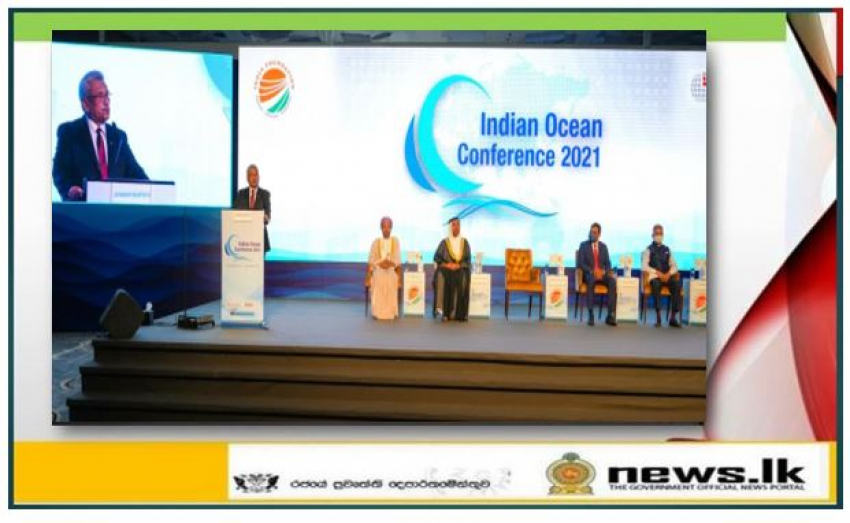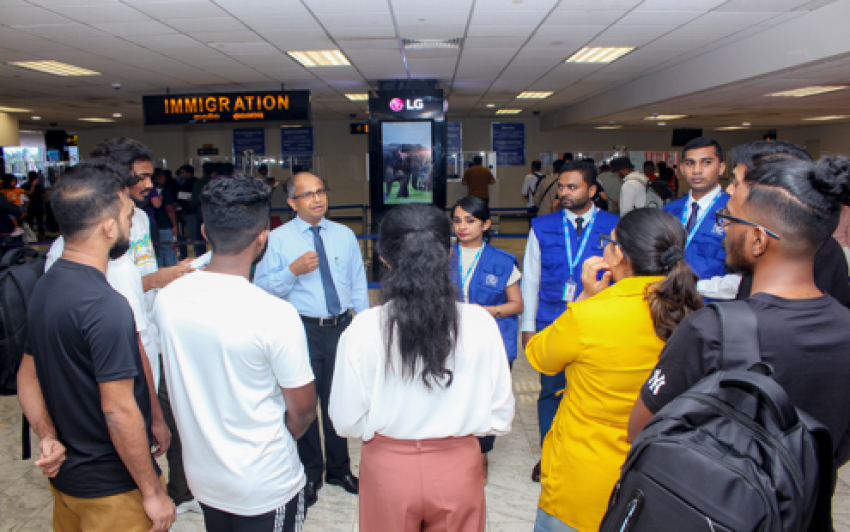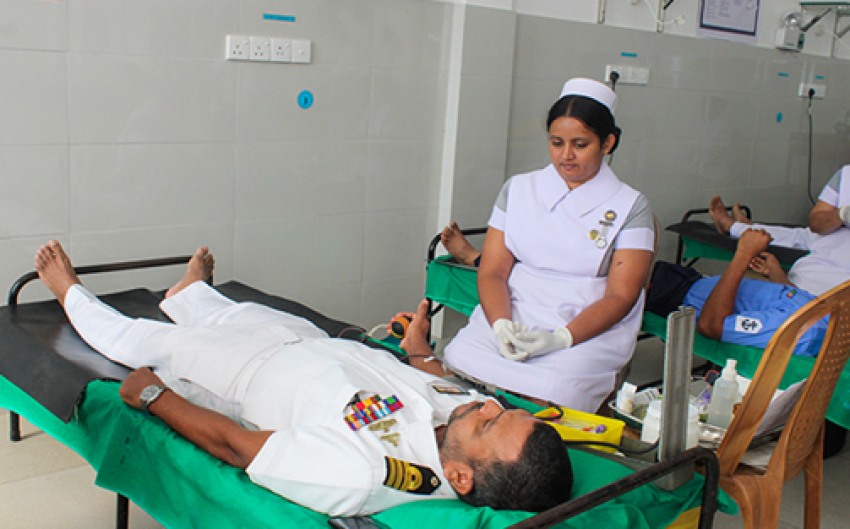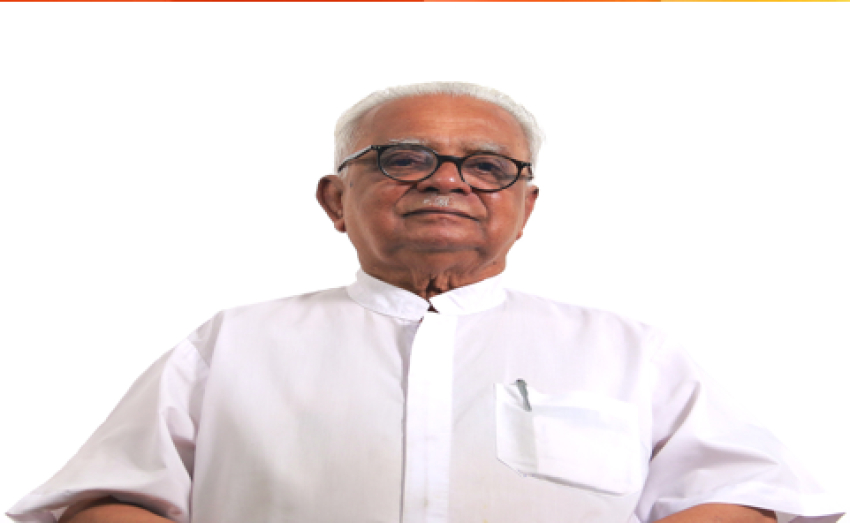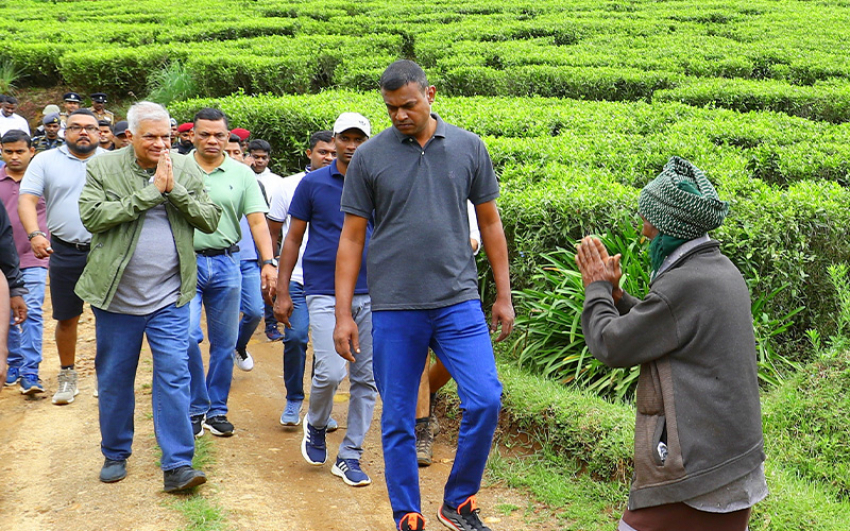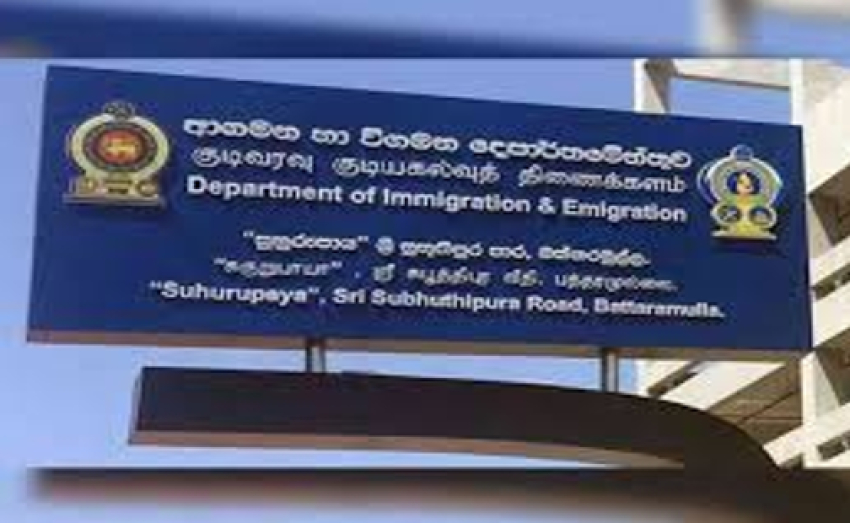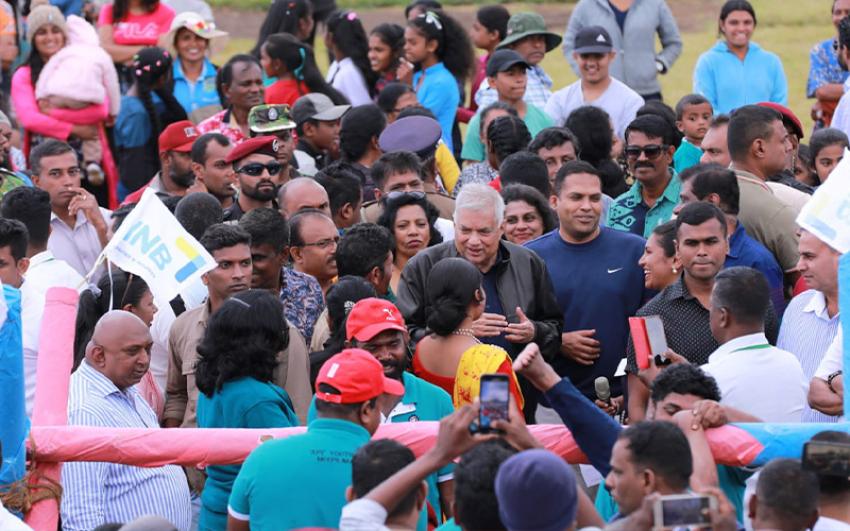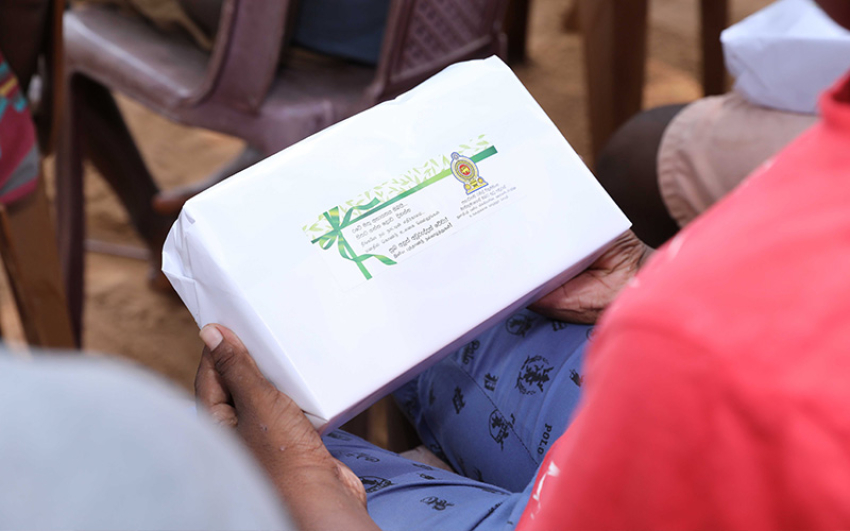President Gotabaya Rajapaksa emphasized that everyone in the region should work together to revive the economy after the COVID-19 pandemic situation.
The President made these remarks delivering the Inaugural Address at the Indian Ocean Conference (IOC) held in Abu Dhabi, the capital of the United Arab Emirates (UAE), (04).
The measures taken worldwide to combat the pandemic, although they proved invaluable in saving countless lives, came at a steep cost. The rapid decline in economic activity these measures caused have had serious long-term consequences on global travel, trade, and economic growth. The President pointed out that developing countries in particular have been very badly impacted by this and that this can only be achieved through the support provided by richer nations to developing countries.
The President said the COVID-19 pandemic will not end until everyone, everywhere is inoculated against the virus and requested the nations with capabilities to provide assistance to underprivileged nations to make their vaccination drives productive.
In contrast to the leadership provided by the World Health Organisation (WHO) for the global pandemic response, no world institution has stepped forward to help countries navigate their economic recovery. Although the pandemic has affected rich and poor countries alike, a disproportionate impact is borne by poorer countries.
The President pointed out that the economies that are already burdened with external debt obligations are facing hardships and therefore, it would be greatly appreciated if more action could be taken by wealthy nations as well as multilateral organisations to forgive, restructure, or grant moratoria for the debt repayments of poorer countries struggling in the wake of the pandemic.
As the pandemic has shown, adverse situations in one country can quickly have ramifications on the wider region and eventually on the globe itself. That is why the countries across the region and the world at large must work together to solve problems that affect nations, whether in terms of epidemics, economy, or ecology. The President said the ongoing climate crisis is perhaps the most difficult challenge that humanity needs to overcome.
The X-Press Pearl disaster was not an isolated incident. The fire on board the MT New Diamond was successfully doused through concerted efforts. The President pointed out that both these incidents point towards the urgent need for stricter controls surrounding the oceanic transport of hazardous and environmentally sensitive materials.
Extra-territorial fishing by well-equipped trawlers is another significant problem in the region that affects the livelihoods of poor communities that rely on local fishing for their sustenance. The President said coordinated action to mitigate such issues will be critical in sustaining the overall ecology and the viability of local economies in the Indian Ocean region in the future and proposed the establishment of a regional mechanism to coordinate such issues relating to sustainability.
While stating that it must be admitted that the Indian Ocean region is also the location of considerable criminal activity, including human smuggling, drugs smuggling, and terrorism, President Rajapaksa said narcotics trafficking remains a significant problem for countries in this region and that this can only effectively be dismantled through coordinated efforts between the intelligence services, Coast Guards and Navies of regional countries. The President pointed out similar coordination and cooperation will be required to contain human trafficking and said such coordination will also be required to counter the threat posed by religious extremism and terrorism in countries in the region. The President said extremist and terrorist ideology can spread with ease from nation to nation unless carefully monitored and suppressed.
The first Indian Ocean Conference commenced in 2016 with the objective of discussing issues of common interest and concerns to countries in the Indian Ocean region and other countries using the Indian Ocean. The Fourth Summit was held in the Maldives in 2019 and the theme was “Securing the Indian Ocean Region: Traditional and Non-Traditional Challenges”.
The theme of IOC 2021 is “Ecology, Economy, Epidemic”.
In his Special Address to the forum, Foreign Minister of Oman Sayyid Badr Bin Hamad Bin Hamood Al Busaidi said President Gotabaya Rajapaksa paved the way for a productive discussion that can act as a platform for effective multilateral action across the Indian Ocean. The Omani Foreign Minister further said we need to take steps today to conserve the extraordinary beauty and biodiversity of the ocean for our future generations and crucially reverse the damage already done through overfishing and pollution.
External Affairs Minister of India S. Jaishankar said Indian ocean nations are called upon today to take greater responsibilities, create better relationships and display more initiatives. He also said in his Keynote Address that we need to expeditiously normalise travel through certification recognition so that the livelihoods affected by the COVID-19 pandemic are restored.
Foreign Ministers representing 18 countries and more than 200 delegates from over 40 countries are attending the conference.
Full text of the speech
Your Excellencies
Distinguished Invitees
Ladies and Gentlemen
It gives me great pleasure to welcome all of you to the 5th Indian Ocean Conference.
At the outset, I take this opportunity to thank the India Foundation, the S. Rajaratnam School of International Studies of Nanyang Technological University Singapore, and the Institute of National Security Studies of Sri Lanka, together with the organising committee, for their efforts for this event.
The Indian Ocean Conference provides an invaluable opportunity for countries in the region as well as our partners to deliberate on the critical issues affecting us.
The theme of this year’s conference centres on three topics, “Ecology, Economy, Epidemic”, that deserve our utmost attention and deepest consideration.
As we meet here today, the most immediate and significant of these is the continuing impact of the COVID19 pandemic on the world at large.
When the COVID-19 virus started spreading around the world in the first quarter of 2020, it posed a serious challenge to all nations.
For perhaps the first time in history, humanity had the sophistication and the resources to actively identify, inhibit, and even try and prevent the widespread devastation of a global epidemic before it was too late.
Urgent actions to save lives were taken by nearly all countries.
These included border closures, lockdowns, and testing, as well as isolating and treating those infected while rapidly tracing their contacts and quarantining them before the virus spread to the wider population.
The able leadership provided by the World Health Organisation during this time was vital in coordinating a global response to this new threat.
The cooperation between nations in the early stages of the pandemic, including sharing data and technical expertise, supporting capacity building in healthcare systems, and financial assistance was truly laudable.
Together with the selfless service rendered by healthcare personnel, scientists, and essential workers around the world, this international cooperation helped humanity through this pandemic.
Sri Lanka took action to curb the spread of the virus very early on.
A national task force involving all key stakeholders within and outside Government was set up to oversee our pandemic response.
After closing borders in late March last year, Sri Lanka imposed a full national lockdown for several weeks to contain the spread of the virus before reopening after bringing transmissions down to near zero.
Other state organs outside the Health Ministry played significant roles in supporting the healthcare system at this time.
The military rapidly constructed new quarantine centres and treatment facilities; managed our quarantine programme, and together with the police, helped public health officials with contact tracing.
This freed healthcare personnel to focus on the medical aspects of our pandemic response.
The Government also supported citizens affected by the lockdown, including grants of cash and dry rations to daily wage earners and those on social welfare schemes.
Even after Sri Lanka reopened after the first lockdown, strict public health measures including mask wearing and social distancing remained in place.
Regional as well as countrywide lockdowns were reimposed whenever new waves of infections spread in the country.
Sri Lanka’s last lockdown ended in October 2021, after which the country has slowly returned to normalcy.
This was enabled by the outstanding success of our vaccination programme.
We have now vaccinated 85% of all over the age of 16 with two doses of a COVID19 vaccine, with 98% having received one dose.
This rapid roll-out of vaccines was facilitated by the military, which set up and operated vaccination centres including mobile services throughout the country to help protect our public in record time.
We greatly appreciate the generosity of India, China, the United States of America, and Japan, all of whom donated vaccines to us either directly or through COVAX, which augmented the larger quantity Sri Lanka purchased from manufacturers on commercial terms.
At the same time, it is a matter of concern that the relatively slow rollout of vaccines in some parts of the world has resulted in the emergence of a potentially devastating new variant of the virus that needs to be carefully monitored in the days and weeks to come.
If existing vaccines are in fact less effective against this new Omicron variant, the world may soon return to square one with border closures and other restrictions including lockdowns imposed once again, with potentially catastrophic consequences.
I therefore call upon nations that have the wherewithal to do so, to support the vaccination drives of less wealthy countries more effectively.
The COVID19 pandemic will not end until everyone, everywhere is inoculated against the virus.
This can only be achieved through far reaching cooperation between nations, and particularly through the support provided by richer nations to developing countries.
Such cooperation will also be necessary to support the global economic recovery following the pandemic.
The measures taken worldwide to combat the pandemic, although they proved invaluable in saving countless lives, came at a steep cost.
The rapid decline in economic activity these measures caused have had serious long-term consequences on global travel, trade, and economic growth.
Developing countries in particular have been very badly impacted.
The loss of revenue from tourism, the loss of foreign exchange remittances from expatriate workers, and the loss of export earnings have been especially devastating.
When combined with the high public expenditure necessary for healthcare and social welfare programmes, as well as the fiscal and monetary policies needed to support economic revival, many developing nations including Sri Lanka now find themselves in a very difficult situation.
Countries that had taken on significant external debt to fund their development programmes are particularly badly affected, with very little reserves available to meet debt repayment obligations.
Sadly, in contrast to the leadership provided by the WHO for the global pandemic response, no world institution has stepped forward to help countries navigate their economic recovery.
Intergovernmental groups, regional blocs, multilateral organisations and individual countries that could have assumed such a role on behalf of the global economy have not done so.
This is unfortunate.
Although the pandemic has affected rich and poor countries alike, a disproportionate impact is borne by poorer countries.
Absorbing or compensating for the loss of revenue from tourism as well as the loss of foreign remittances from expatriate workers overseas due to the economic consequences of the pandemic, is not easy for smaller economies.
It is especially hard for economies that are already burdened with external debt obligations.
It would therefore be greatly appreciated if more action could be taken by wealthy nations as well as multilateral organisations to forgive, restructure, or grant moratoria for the debt repayments of poorer countries struggling in the wake of the pandemic.
This kind of support would greatly help those countries in their time of need, and more broadly, assist a speedier global recovery.
I hope that such support would be forthcoming in the future.
As the pandemic has shown, adverse situations in one country can quickly have ramifications on the wider region and eventually on the globe itself.
That is why the countries across the region and the world at large must work together to solve problems that affect nations, whether in terms of epidemics, economy, or ecology.
In this context, the ongoing climate crisis is perhaps the most difficult challenge that humanity needs to overcome.
As the recent United Nations Climate Conference has shown, achieving truly global consensus on this critical issue is difficult.
Nevertheless, global action on limiting deforestation, curbing use of fossil fuels, preventing overexploitation of finite resources, and increasing use of renewable energy is essential.
As a developing island nation that is very vulnerable to climate change, Sri Lanka is deeply aware of these dangers.
Adverse weather patterns caused by climate change have already affected the country on several occasions in the past decade.
There is every likelihood that the impact of these phenomena will worsen in time to come.
We must act now before it is too late.
Sri Lanka has been active on the global stage in response to the ongoing climate crisis.
In 2019, the Colombo Declaration on Sustainable Nitrogen Management was formulated to support the target of halving harmful nitrogen waste globally by 2030.
Sri Lanka is a co-lead of the Energy Compact for No New Coal Power, and leads the Action Group on Mangrove Restoration in the Commonwealth Blue Charter Initiative.
At the national level, my government has pledged to increase the contribution of renewable energy sources to our power requirements to 70% by 2030.
We have prioritised enhancing national forest cover and we hope to strengthen our carbon sequestration capacity by 7% between now and 2030.
Sri Lanka also aims to achieve carbon neutrality by 2050.
The use of artificial fertiliser is strongly discouraged, and our policy is to support the rapid development of organic agriculture within the country in future.
A range of policy actions is also required on ecological issues that are related to but distinct from climate change.
Earlier this year, the container ship X-Press Pearl caught fire off the coast of Colombo, Sri Lanka.
Despite concerted efforts by the Sri Lanka Navy, Air Force, and Coast Guard together with Indian Naval and Coast Guard vessels, the fire continued for several days, and the ship ultimately sank, off Sri Lankan waters.
Enormous environmental damage was caused by this incident.
Hazardous chemicals including nitric acid and other toxic substances, as well as several tonnes of oil and plastic resin pellets from spilled cargo, were released into the ocean.
The resulting pollution prevented fishing and adversely affected the livelihoods of thousands in our seaboard communities for months and may continue to pose significant danger to marine life in the long term.
The X-Press Pearl disaster was not an isolated incident.
Less than a year before it occurred, another significant maritime disaster was only narrowly averted.
The fire on board the MT New Diamond, which was transporting a large quantity of crude oil near our waters, was successfully doused through concerted efforts by Sri Lanka’s Navy and Air Force, with support from India as well as two Russian Naval vessels in the region at the time.
Both these incidents point towards the urgent need for stricter controls surrounding the oceanic transport of hazardous and environmentally sensitive materials.
Similar controls also need to be imposed on overfishing and ecologically damaging practices including bottom trawling, long-line fishing and blast fishing in the Indian Ocean region.
These practices severely deplete fish stocks, result in wasteful bycatch of marine species, and cause devastation to other organisms that are critical to sustaining marine ecosystems.
Extra-territorial fishing by well-equipped trawlers is another significant problem in the region that affects the livelihoods of poor communities that rely on local fishing for their sustenance.
Coordinated action to mitigate such issues will be critical in sustaining the overall ecology and the viability of local economies in the Indian Ocean region in the future.
I therefore propose the establishment of a regional mechanism to coordinate such issues relating to sustainability.
Another critical area of focus for countries in the Indian Ocean Region and our global partners is security.
A considerable proportion of the world’s trade in commodities and manufactured goods takes place through the Indian Ocean region.
Maintaining the integrity of its sea lines of communication is therefore of utmost importance to the global economy.
In this context, however, it must be admitted that the Indian Ocean region is also the location of considerable criminal activity, including human smuggling, drugs smuggling, and terrorism.
These are all major issues that need to be addressed.
Narcotics trafficking remains a significant problem for countries in this region.
Sri Lanka has spent considerable effort over the past several years on intercepting shipments of narcotics including heroin, ice, and cannabis by criminal networks that operate in its waters.
These are truly transnational networks whose different aspects are overseen by criminal operatives from various nations.
Often, the leaders of a particular drug network are based in one nation, while the drugs they traffic in are produced in a different country and transported by persons of various nationalities to yet other countries around the region.
Due to the complex, transnational nature of these networks, they can only effectively be dismantled through coordinated efforts between the intelligence services, Coast Guards and Navies of regional countries.
Further improving intelligence sharing and cooperation within the region is therefore critically important to curbing this threat.
Similar coordination and cooperation will be required to contain human trafficking, which has become a lucrative business for criminal operatives in this region.
Sri Lanka has been used in past years both as a source and as a transit point for illegal migration to Oceania.
However, this activity has by now been largely curbed through close cooperation between the Sri Lankan and Australian Governments.
This is a very good example of what can be achieved through greater coordination between countries.
As we go forward, such coordination will also be required to counter the threat posed by religious extremism and terrorism in countries in the region.
As Sri Lanka’s experience with the devastating Easter Sunday attacks of 2019 has shown, this problem too is not one that can be contained to any specific locality.
Extremist and terrorist ideology can spread with ease from nation to nation unless carefully monitored and suppressed.
The only way to do this is through intelligence sharing and other forms of inter-governmental action, which I strongly advocate for.
I am confident that with greater international cooperation, countries in our region will be able to better withstand all the challenges that they face in terms of ecology, economy and epidemics.
I trust that over the forthcoming sessions, participants will have fruitful dialogue on these issues.
I hope that they will be able to arrive at a broader understanding on what we, as nations in the region, can do collectively towards resolving our common issues.
I assure you that Sri Lanka will fully cooperate in any regional mechanisms proposed to meaningfully accomplish this.
I have utmost confidence that no matter how challenging these issues may be, we can overcome them successfully if we approach them together in a spirit of true cooperation and goodwill.
Thank you.

